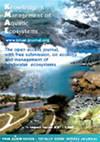保护现状和濒危淡水贻贝的新恢复Unio克拉苏菲利普松,1788:波兰案例
IF 1.7
3区 环境科学与生态学
Q3 FISHERIES
引用次数: 4
摘要
双壳类在淡水生态系统中发挥着重要作用,改善了水质;厚壳河蚌(Unio crasssus)被列为生物指示物。不幸的是,这个物种被认为是濒危物种,在整个欧洲都受到物种保护。其种群急剧减少的原因是:水体的大量富营养化、广义上的人为影响和入侵物种的存在。克拉苏的生命周期包括幼虫阶段,幼虫是鱼类的强制性寄生虫。这使得该物种有可能分散并在新的领土上繁衍,但它限制了该物种在有适当宿主物种的地方的发展。波兰已经采取了密集的措施来保护美国克拉苏,而在法国,该物种的许多新地方已经被条形码。2010-2014年,波兰南部采取了积极的保护措施,包括清查、遗传多样性研究和重新引种。该项目促进了厚壳河蚌种群丰度和地点数量的增加,从而使该物种在河流中出现的范围增加了两倍。这里提出的程序可以而且应该用于进一步归还美国克拉苏,不仅在波兰,而且在欧洲其他地方。本文章由计算机程序翻译,如有差异,请以英文原文为准。
Conservation status and a novel restoration of the endangered freshwater mussel Unio crassus Philipsson, 1788: Poland case
Bivalves play an important part in freshwater ecosystems and improve water quality; the thick-shelled river mussel Unio crassus is classified as a bioindicator. Unfortunately, the species is regarded as endangered and is under species protection in the whole of Europe. The reasons for the drastic decline of its populations are: considerable eutrophication of waters, anthropogenic influence in its broad sense and the presence of invasive species. The life cycle of U. crassus includes the stage of larva which is an obligatory parasite of fish. This makes it possible for the species to disperse and populate new territories but it limits the development to places where appropriate host species are available. Intensive measures have been taken in Poland to protect U. crassus, while in France numerous new localities of the species have been bar-coded. In 2010–2014 active protection measures were taken in southern Poland, including inventorying, studies of genetic diversity and reintroductions. The project contributed to the increase in population abundance and in the number of localities of the thick-shelled river mussel, which resulted in a twofold increase in the range of occurrence of the species in the river. The procedures presented here can and should be used in further restitution of U. crassus not only in Poland but also elsewhere in Europe.
求助全文
通过发布文献求助,成功后即可免费获取论文全文。
去求助
来源期刊

Knowledge and Management of Aquatic Ecosystems
环境科学-海洋与淡水生物学
CiteScore
3.70
自引率
5.60%
发文量
22
审稿时长
>12 weeks
期刊介绍:
Knowledge and Management of Aquatic Ecosystems (KMAE-Bulletin Français de la Pêche et de la Pisciculture since 1928) serves as a foundation for scientific advice across the broad spectrum of management and conservation issues related to freshwater ecosystems.
The journal publishes articles, short communications, reviews, comments and replies that contribute to a scientific understanding of freshwater ecosystems and the impact of human activities upon these systems. Its scope includes economic, social, and public administration studies, in so far as they are directly concerned with the management of freshwater ecosystems (e.g. European Water Framework Directive, USA Clean Water Act, Canadian Water Quality Guidelines, …) and prove of general interest to freshwater specialists. Papers on insular freshwater ecosystems and on transitional waters are welcome. KMAE is not a preferred journal for taxonomical, physiological, biological, toxicological studies, unless a clear link to ecological aspects can be established. Articles with a very descriptive content can be accepted if they are part of a broader ecological context.
 求助内容:
求助内容: 应助结果提醒方式:
应助结果提醒方式:


